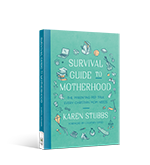
Sign Up for Updates
Connect
TOPICS
- Latest Blog
- Fiction
- Inspirational/Devotional
- Men's Christian Living
- Prophecy
- Women's Christian Living
- View All
ARCHIVES
Do You View the Hard Parts of Motherhood as Challenges or Afflictions?
Posted on Aug 03, 2023 Topic : Inspirational/Devotional, Women's Christian Living
Posted by : Abbie Halberstadt

All suffering is hard. But not all hardship is suffering.
Oxford Languages dictionary says that to suffer is to “experience or be subjected to (something bad or unpleasant).”
Conversely, a challenge is a “task or situation that tests someone's abilities.”
That’s a crucial distinction to make, especially when I am seeking, first and foremost, to tackle the question of finding the good in those testing circumstances rather than the conundrum of why some of us suffer more than others.
Thankfully, the Bible has much to say about what our response to difficulty should be (take the Lord’s telling Joshua to “be strong and courageous” no fewer than three times in as many sentences as He gives ol’ Josh the daunting task of driving the pagan peoples from the Promised Land). My goal is always to return to the truth of Scripture, no matter how far into the weeds of worldly culture we have strayed. So if you opened this book hoping for encouragement that motherhood is hard but we can do hard things in Christ’s strength, with His Word as our guide, then you are in the right place!
One of the reasons I feel compelled to lay out so clearly the differences between hardship and suffering is that popular motherhood messaging hammers us with the assurance that much of what we encounter from our children on a daily basis is not merely a challenge but instead, true affliction.
I get it! I coined the term “emotional terrorist” in our home for those moments when the three-year-old is leveraging every bit of his lung capacity, his mess-making prowess, and his iron will to intentionally torpedo my day.
Or at least, that’s what it can seem like he’s doing when my focus rests solely on the disruption to my peace, the injury to my feelings, and the upending of my neat little plan for the day. But regardless of how hard my emotions work to convince me I am justified in my disdain for this pint-sized impediment to either my productivity or my relaxation, Scripture tells a different story.
In one of the most quoted yet least understood verses in the Bible, Paul says, “I can do all things through Christ who strengthens me” (Philippians 4:13 NIV). Sure, Paul can do “all things” through Christ. But what “all things” exactly? I’m paraphrasing, of course, but this is the exact quote that sums it all up: “I have learned the secret of being content in any and every situation” (Philippians 4:12 NIV). So that means: When the baby sleeps, or when he wakes up seven times. When the teenager participates with a helpful attitude, or when he drags his feet and mutters under his breath. When the nine-year-old cleans up after her muffin-baking, or when she drops a flour grenade on the kitchen floor and walks away.
Well, shoot.
You mean, we’re not victims of our children’s tendency to upchuck an entire lunch of undigested chicken quesadillas an hour into a road trip? Of their propensity to embarrass us in public with the way they parrot our impatient tones? Of their fondness for smashing that one heirloom dish we asked them never to touch?
Short answer: No, we’re not.
Our children are not “something bad or unpleasant we are being subjected to,” to borrow from the above definition of suffering. And yet, when we view “dealing with” their more challenging traits as suffering rather than as a hard-but-good opportunity to grow in Christlikeness, we gravitate toward a Motherhood of Martyrdom—an attitude sure to bleed into the way we treat our families.
Not only that, but the more we muddle true suffering in with hard mothering days, the less likely we are to find comfort in verses like 2 Corinthians 4:17, which says, “Therefore we do not lose heart. Though our outer self is wasting away, yet our inner self is being renewed day by day. For our light and momentary affliction is producing for us an eternal weight of glory that is far beyond comparison. Therefore, we fix our eyes not on what is seen, but on what is unseen. For what is seen is temporary, but what is unseen is eternal.”
Suffering is real. Hardship is inevitable. But conflating the two within the context of motherhood is a surefire way to “lose heart” and lose sight of the unique opportunity every hard day gives us to throw ourselves onto the safety net of Jesus’ new morning mercies, firm in the knowledge that it will never break.

Read more in Hard Is Not the Same Thing as Bad by Abbie Halberstadt

